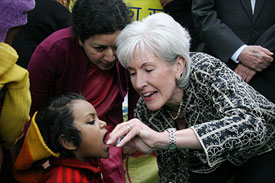Research plays key role in new HHS global health strategy
January / February 2012 | Volume 11, Issue 1

Photo courtesy of U.S. State Department
HHS Secretary Kathleen Sebelius said the agency's new
strategic plan for global health emphasizes both threats
and opportunities, including childhood vaccination
programs.
Protecting Americans' health and security while providing leadership and expertise to improve health worldwide are the overarching goals detailed in the Global Health Strategy unveiled recently by the U.S. Department of Health and Human Services.
"Health is an issue which aligns the interests of the countries around the world," noted HHS Secretary Kathleen Sebelius, speaking at a Washington event to launch the plan. "If we can limit the spread of pandemics, all people benefit. A new drug developed on one continent can just as easily cure sick people on another. A safe global food and drug supply chain will mean better health for every country."
The new strategy takes into account both the threats and opportunities across the globe, she added. The approach isn't a radical change of direction but seeks to better employ HHS's unique expertise, resources and relationships to have the biggest possible impact. HHS - made up of 11 agencies including the NIH, the Center for Disease Control and Prevention, the Food and Drug Administration and the Health Resources and Services Administration - has more than 300 officials stationed in 75 countries.
One of the plan's aims is to focus on global engagement that protects and promotes the health and well-being of Americans, said Sebelius. "Whether it's building networks that can spot and contain emerging infectious diseases, or creating research partnerships that help bring new treatments and cures to our pharmacy aisles, we will look for opportunities where our collaborations around the world can improve health here in the U.S."
With more than a million people crossing U.S. borders daily, disease surveillance is critical, she said. In addition, nearly half of the fruit and over three quarters of the seafood consumed in America is imported from abroad. Many medicines also come from overseas, she noted, often from countries lacking stringent safety controls. "In a world in which the flow of people and goods stretches across the globe, our only chance to keep Americans safe is if our systems for preventing, detecting and containing disease stretch across the globe too," Sebelius declared.
Another goal is to provide leadership in areas where HHS has special technical expertise but doesn't duplicate work already underway or better handled by another government or NGO partner. "We will focus on the areas where HHS has unique resources and knowledge," she said, "starting with the world's leading researchers at the NIH, its leading epidemiologists at the CDC, and its leading regulators at the FDA."
HHS Global Health Objectives
- Enhance Global Health Surveillance
- Prevent Infectious Diseases and Other
Health Threats
- Prepare for and Respond to Public Health
Emergencies
- Increase the Safety and Integrity or Global
Manufacturing and Supply Chains
- Strengthen International Standards through
Multilateral Engagement
- Catalyze Health Research Globally
- Identify and Exchange Best Practices to
Strengthen Health Systems
- Address the Changing Global Patterns of
Death, Illness and Disability
- Support the Global Health Initiative (GHI)
- Advance Health Diplomacy
Global health diplomacy is the plan's third area of concentration, to advance U.S. interests through partnerships with the State Department, USAID, and others. The strategy is designed to support the President's Global Health Initiative, an interagency effort, and takes into account the GHI focus on investing in the health of women and girls. "This is something I've seen firsthand in both the U.S. and in my travels around the globe," Sebelius observed. "When you give women better access to health information and services, there are huge benefits not just for the women themselves, but also for their children, families, and communities."
Other principles underlying the new global health plan include using evidence-based knowledge to inform decisions, emphasizing prevention to improve health, and leveraging strengths through partnership and coordination. In addition, HHS efforts should improve health equity, respond to local needs, build in-country capacity and ensure a lasting, measurable impact.
Sebelius said global health collaborations bolster America's stature around the world. "One of the striking aspects of my trips outside our country is how much eagerness there is to work together on health issues," she noted. "When it comes to trade or foreign policy, there are often areas of strong disagreement. But when the discussion turns to tackling our biggest health challenges, there is a broad consensus that nations must work together."
Improving health also benefits the global economy, Sebelius concluded. "A healthier world is one in which every nation will have more productive workers, longer lives, and larger markets for its goods and services. The U.S. can and should play an active role in shaping these efforts."
More Information
To view Adobe PDF files,
download current, free accessible plug-ins from Adobe's website.